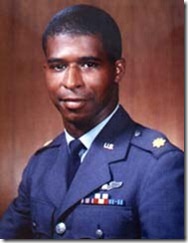Celebrating Black History Month 2011

Major Lawrence was quite impressive: college graduate at 20 (Bradley University), a USAF pilot at 21, and a holder of a Ph.D. in Physical Chemistry from Ohio State.
Major Lawrence was accepted into the USAF’s Manned Orbital Laboratory program in June, 1967.
Unfortunately, in December 1967, Major Lawrence lost his life when a Starfighter he was in crashed, and he was killed.
Despite the fact that Robert Lawrence did not make it into space, he was the first Black Astronaut, and I am both celebrating and lauding that here.
To the stars, Major Lawrence. To the Stars!
He was a senior USAF pilot, accumulating well over 2,500 flight hours—2,000 of which were in jets. Lawrence flew many tests in the Lockheed F-104 Starfighter to investigate the gliding flight of various unpowered spacecraft returning to Earth from orbit, such as the North American X-15 rocket-plane. NASA cited Lawrence for accomplishments and flight maneuver data that "contributed greatly to the development of the Space Shuttle."
In June 1967, Lawrence successfully completed the Air Force Flight Test Pilot Training School at Edwards AFB, California. That same month he was selected by the USAF as an astronaut in the Air Force's Manned Orbital Laboratory (MOL) program, thus becoming the first black astronaut.
Lawrence was killed on December 8, 1967, in the crash of an F-104 Starfighter at Edwards Air Force Base, California. He was flying backseat on the mission as the instructor pilot for a flight test trainee learning the steep-descent glide technique. The pilot flying made such an approach but flared too late. The airplane struck the ground hard, the main gear failed, and the airplane caught fire. The front seat pilot of the aircraft successfully ejected upon ground impact and survived the accident, but with major injuries. By the time Lawrence ejected, the airplane had rolled onto one side and his ejection seat, with Lawrence still in it, struck the ground, killing him instantly.
Had Lawrence lived he likely would have been among the MOL astronauts who transferred to NASA after the program's cancellation, all of whom flew on the Space Shuttle.[4] During his brief career, Lawrence earned the Air Force Commendation Medal, the Outstanding Unit Citation, and was posthumously awarded the Purple Heart medal. After many years of relative obscurity, on December 8, 1997, his name was inscribed on the Space Mirror Memorial at the Kennedy Space Center in Florida.
